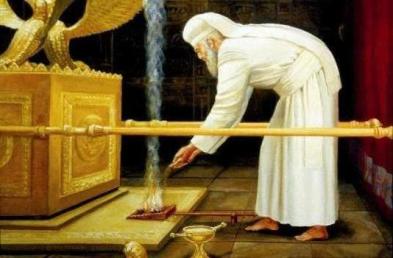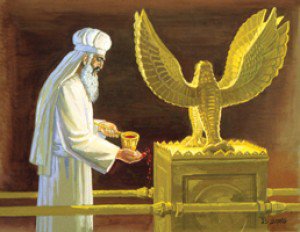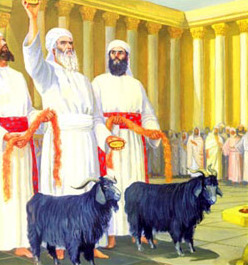אחרי מות
Parasha “Acharei Mot”
Wayyiqra (Leviticus) 16:1-18:30
And YaHuWaH spoke to Mushah after the death of the two sons of Aharon, as they drew near before YaHuWaH, and died. – Wayyiqra (Leviticus) 16:1
This Torah Portion is entitled אחרי מות “Acarei Mot” meaning “after the death.” After the death of Nadab and Abihu, who offered strange fire and were consumed, YaHuWaH warned and instructed Aharon by Mosheh (Mushah). YaHuWaH warns that Aharon must not come in the Most Qodesh (Set-Apart) place inside the veil.
Wayyiqra (Leviticus) 16:2And YaHuWaH said to Mushah, “Speak to Aharon your brother not to come in at all times to the Set-apart Place inside the veil, before the lid of atonement which is on the ark, lest he die, because I appear in the cloud above the lid of atonement!
Only one day in an entire year could the Kohen HaGadol( High Priest) enter the Most Qodesh place. This one day would be the most Qodesh of all days, known as Yom Kippur the day of covering or atonement. Upon this day the Kohen HaGadol must purify himself by bathing in living water. He will wear qodesh linen garments, however only his basic linen garments. He is to dress as an ordinary Kohen and not wear his royal crown or Ephod. After he is cleansed and dressed he must enter the presence of YaHuWaH, behind the veil in the Most Qodesh place. Before offering any sacrifices, he must take a pan full of fiery coals from the altar before YaHuWaH and fill his hands with finely ground ketoret (incense) and then enter beyond the Parochet (veil). There he is to place the ketoret upon the fire and the cloud of incense will rise and cover the Kaporet (lid/covering) of the Ark of the Covenant. The scriptures emphasize the relationship that incense has with Tefilla (Prayer), we know that many special prayers were spoken by the Kohen Ha’Gadol as he entered the presence of YaHuWaH.
Wayyiqra (Levitivus) 16:13“And he shall put the incense on the fire before YaHuWaH, and the cloud of incense shall cover the lid of atonement which is on the Witness, lest he die.
On Yom Kippur, the Kohen Ha’Gadol offered up the blood of his sacrifices to make atonement for himself.
Wayyiqra (Leviticus) 16:6“And Aharon shall bring the bull as a sin offering, which is for himself, and make atonement for himself and for his house.
The Kohen Ha’Gadol is commanded to take some of the blood of the bull and sprinkle it with his finger on the lid of atonement specifically on the east side. He is also required to sprinkle the blood in front of the lid of atonement his finger seven times.
The Kohen also makes atonement for his people. For the congregation of the children of Yisrael (Yashar’el) he is to take two male goats as a sin offering and one ram as a burnt offering.
Wayyiqra (Leviticus) 16:8 “And Aharon shall cast lots for the two goats, one lot for YaHuWaH and the other lot for Azazel.9“And Aharon shall bring the goat on which the lot for YaHuWaH fell, and shall prepare it as a sin offering.10“But the goat on which the lot for Azazel fell is caused to stand alive before YaHuWaH, to make atonement upon it, to send it into the wilderness to Azazel.
The goat whose lot was “For YaHuWaH” is sacrificed as an offering and its blood is sprinkled in the The Most Qodesh place.
Wayyiqra (Leviticus) 16:15 “And he shall slaughter the goat of the sin offering, which is for the people, and shall bring its blood inside the veil, and shall do with that blood as he did with the blood of the bull, and sprinkle it on the lid of atonement and in front of the lid of atonement.16 “And he shall make atonement for the Set-apart Place, because of the uncleanness of the children of Yashar’al (Yisrael), and because of their transgressions in all their sins. And so he does for the Tent of Meeting which is dwelling with them in the midst of their uncleanness.
Some of the blood was also used to atone for the altar.
Wayyiqra (Leviticus) 16:18 “And he shall go out to the altar that is before YaHuWaH, and make atonement for it. And he shall take some of the blood of the bull and some of the blood of the goat, and put it on the horns of the altar all around.19“And he shall sprinkle some of the blood on it with his finger seven times, and cleanse it, and set it apart from the uncleanness of the children of Yashar’al (Yisrael).
The goat for “Azazel” is a not offered as a sacrifice, rather:
Wayyiqra (Leviticus) 16:21 “Then Aharon shall lay both his hands on the head of the live goat, and shall confess over it all the crookednesses of the children of Yisra’Ãl, and all their transgressions in all their sins, and shall put them on the head of the goat, and shall send it away into the wilderness by the hand of a fit man.22“And the goat shall bear on itself all their crookednesses, to a land cut off. Thus he shall send the goat away into the wilderness.
The word Azazel is often translated “scapegoat” and rightfully so because it carries the sin in the wilderness. However it should be noted that Azazel is recorded in the Book of Hanok (Enoch) as the name of the chief fallen one. This is a bit of a showdown so to speak, that takes place once every year, where YaHuWaH’s offering is made Qodesh and “Azazel” is “defeated” by being exiled. There is history that mentions the scapegoat running off the edge of a cliff and plummeting to its death. Whoever took the goat outside the camp must wash his body before coming back into the camp. The skins, flesh and dung of the sin offerings are also taken outside the camp and burned with fire, whoever took them must likewise bathe before entering the camp.
Wayyiqra (Leviticus) 16:29“And this shall be for you a law forever: In the seventh month, on the tenth day of the month, you afflict your beings, and do no work, the native or the stranger who sojourns among you.30“For on that day he makes atonement for you, to cleanse you, to be clean from all your sins before YaHuWaH.31 “It is a Sabbath of rest for you, and you shall afflict your beings – a law forever.
Wayyiqra (Leviticus) 16:34 “And this shall be for you a law forever, to make atonement for the children of Yashar’al (Yisrael), for all their sins, once a year.” And he did as YaHuWaH commanded Mushah.
This portion ends by warning against making a sacrifice without bringing it to the door of the Tent of Meeting/ Temple, forbidding the eating of blood, and prohibiting incest, bestiality, “homosexuality” (sodomite activity) and various perverse sexual sins.
Wayyiqra (Leviticus) 18:24 ‘Do not defile yourselves with all these, for by all these the nations are defiled, which I am driving out before you.25‘Thus the land became defiled, therefore I punished it for its crookedness, and the land vomited out its inhabitants.26 ‘But you, you shall guard My laws and My right-rulings, and not do any of these abominations, the native nor stranger who sojourns among you,27 because the men of the land who were before you have done all these abominations, and thus the land became defiled,28‘So let not the land vomit you out for defiling it, as it vomited out the nations that were before you.29 ‘For whoever does any of these abomi- nations, those beings who do them shall be cut off from among their people.30 ‘And you shall guard My Charge, so as not to do any of these abominable practices which were done before you, so as not to defile yourselves by them. I am YaHuWaH your Elohim.’ ”
Yahuwshuwa, the Messiah, is our Kohen Gadol (High Priest) after the order of Malki Tzedek. Though the earthly Kohen Ha’Gadol used to enter the Most Qodesh place once a year when the Temple still stood, Yahuwshuwa has entered beyond the veil once and for all. There he remains in Shamayim (“heaven”) until the restoration of all things. He is our Kippur offering even though the Temple of YaHuWaH on earth has been destroyed.





